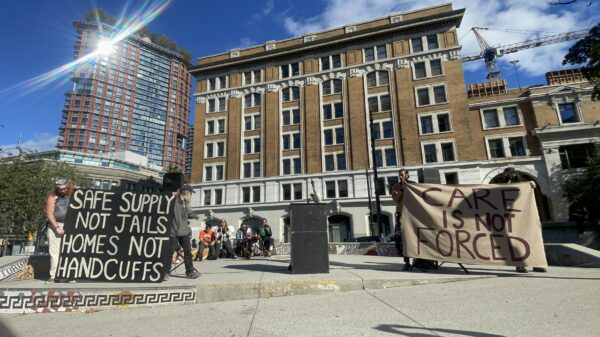St. Ehlmo hotel, photo credit: Susannah Anderson
On May 31st, 2014, another Single Room Occupancy (SRO) Hotel in Vancouver’s Downtown East Side (DTES) was sold to an undisclosed private investor for $989,000.00. The St. Ehlmo hotel is located in the East Hastings Corridor at 425 Campbell St. It is a 3-story building with 18 single occupancy rooms which cost approximately $400 per month. For that money, the residents have the “luxury” of sharing two toilets and one shower per floor. The listing for St. Ehlmo hotel on the Colliers International website claims the appeal of the St. Ehlmo hotel is that it “represents a fantastic opportunity to add value and capitalize on the power of revitalization.”[1]
So far it is not clear whether the new owners of St. Ehlmo intend to keep the hotel a low-income SRO or proceed in the spirit of the gentrification of the DTES and convert St. Ehlmo for higher-income renters. However there are worrying signs that the 18 SROs in St. Ehlmo are slated to be gentrified. The previous owner of St. Ehlmo’s sold both the Thornton Park and Station hotels to Living Balance, a company owned by Steven Lippman. Lippman spared no time gentrifying both hotels.
The new owner of the St. Ehlmo hotel is the De Cottiis family who, through their companies Onni Development and Amacon Development, have been deeply involved in Vancouver’s condo development for decades. Presently, 9 out of 18 rooms in the St. Elhmo’s hotel are empty. The nine tenants who left the hotel were not evicted, but the rooms they vacated were not put on the rental market by the new owner. This potential loss of another 18 units of low-income housing in the DTES comes on the heels of other recent acquisitions of SRO hotels in the DTES, most notably by Living Balance, which now owns 10 SRO hotels,[2] and InstaFund, a commercial mortgage funder which has in the past several years facilitated the sale of 10 SROs in the neighbourhood.[3] The intrusion of Living Balance alone into the DTES has translated into a loss of at least 400 rooms for low-income people, contributing to the continued increase in homelessness in Vancouver.[4]
The gentrification formula
More often than not the purchase of an affordable hotel is followed by rent increases, allegedly justified by the cost of renovations. These increases are weigh heavily on low-income tenants, who often live on fixed incomes in the form of welfare, basic pension, or disability pensions. Landlords often take a diversity of approaches to ensure the conversion of a building. Low-income residents are often bullied and pressured to move out by their new landlords who charge spurious fees. For example, when landlords set up key fob access system to a SRO they often charge tenants fees for key fobs even though that is contrary to the BC Tenants Act.[5] Also, tenants are often illegally charged additional fees when they lose their key fob, even though the tenancy act allows the landlords to charge only for a “direct replacement cost."[6]
Gentrification of the DTES is often labelled by developers and investors as a project of “revitalization.” The neighbourhood is portrayed as being neglected by various levels of government and having fallen into a state of disrepair due to the supposed moral or psychological inadequacies of its residents. This state is often seen as justifying the intrusion of investors into the neighbourhood. In a recent interview with Vancouver Magazine, Chip Wilson, one of the co-founders of Lululemon, talks about his decision to enter the DTES real-estate game. Wilson’s acquisitions in the DTES include two buildings in the 800 block of East Hastings, an empty lot behind Astoria Hotel, and The General Paint building on the corner on Venables and Vernon. He claims that his goal is to “save Vancouver from itself."[7]
Wilson intends to take a three-pronged approach to bringing the city up to its full potential. Firstly, he intends to educate residents of the DTES on what he calls the “psychology of success” by starting an education drop-in centre where residents can come and listen to self-motivation seminars on “money and success.” Secondly, Wilson intends to take a so-far unspecified “behind the scenes” approach to municipal politics which includes donating money to Vancouver Mayor Gregor Robertson’s re-election campaign in November 2014. It seems that Wilson intends to model his support for Robertson on his support for Premier Christy Clark in last provincial election. And finally, Wilson will invest $300 million in the real-estate market.[8]
The question of whether Wilson, or any other powerful person in his position, believes in his own messianic narrative is perhaps irrelevant. What matters is that it has become both socially acceptable and politically expedient to talk in terms of grand visions and good intentions while ignoring the real issues. At the end of the day it is actions that speak more clearly than words – actions aimed squarely at the low-income people and communities who stand in the way of making profit in the never-ending drive of capital.
+
Notes
[1] Colliers International listing for St. Elhmo hotel: https://www.collierscanada.com/8044#.U6zJt_m-1sI
[2] Living Balance Group website: http://livingbalancegroup.com/620WPender/living-balance/
[3] InstaFund (Commercial) website: http://instafund.com/commercial/what-weve-done/single-room-occupancy-sro/
[4] Jean Swanson “Limpmanopoly! (Antigentrification Art Poster)” http://downtowneast.net/2014/05/19/lippmanopoly/
[5] BC Tenancy agreement / Rights and Responsibilities / Refundable and non-refundable fees http://www.rto.gov.bc.ca/content/rightsresponsibilities/entering.aspx#118
[6] BC Tenancy agreement / Rights and Responsibilities / Refundable and non-refundable fees http://www.rto.gov.bc.ca/content/rightsresponsibilities/entering.aspx#118
[7] Frances Bula interview with Chip Wilson http://www.vanmag.com/News_and_Features/Chip_Wilson_Life_after_Lululemon?page=0%2C0
[8] Ibid.
















